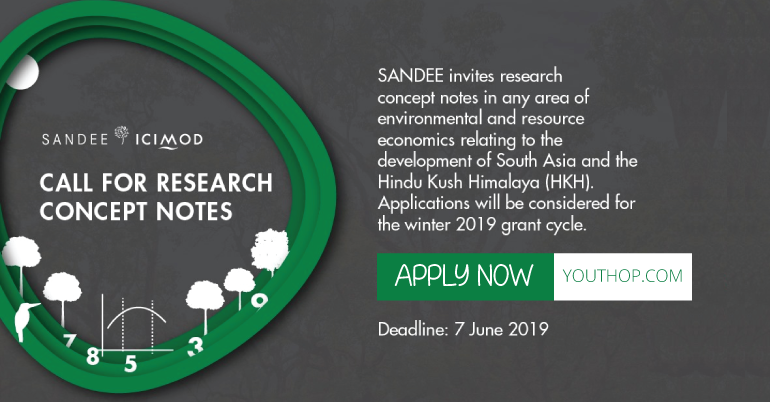The South Asian Network for Development and Environmental Economics (SANDEE) is inviting research concept notes in any area of environmental and resource economics relating to the development of South Asia and the HKH. Of particular interest are concept notes that demonstrate a clear demand from policymakers for their underlying research, although any research idea within the scope of SANDEE that has scientific merit will be considered. The recently published landmark HKH Assessment report, coordinated by ICIMOD under its Hindu Kush Himalayan Monitoring and Assessment Programme (HIMAP), identifies several gaps in the evidence base to take actions to safeguard the mountain environment and improve the livelihoods of people living in the area and downstream. Accordingly, concept notes addressing relevant issues identified in the report will be of particular interest.
To get more exciting opportunities like this, at your fingertips, install the Youth Opportunities Mobile App here from your cellphone.
They encourage research on issues of interest to national, provincial, and local policymakers in the region, including environmental issues faced by people living in the plains, hills, and mountains. Researchers working in the region (South Asia plus the HKH region) who are affiliated with member universities of the Himalayan University Consortium (HUC), an initiative within ICIMOD, are encouraged to apply. They will consider proposals that critically examine the implementation of the Nationally Determined Contributions (NDCs) that each country has submitted to the United Nations Framework Convention on Climate Change (UNFCCC) under the Paris Agreement. Other areas of interest are urban environmental issues and sustainability, energy access and efficiency, and disaster resilience.
Examples of research previously supported by SANDEE include the following:
- Country-wide assessments of the linkages between climate change and agriculture and its effect on migration in Bangladesh, India, and Pakistan and a case study of incentives for recycling lead acid batteries under India’s Deposit-Refund Scheme
- An analysis of possible payments to farmers for ecosystem services in Bhutan and an examination of biodiversity and economic indicators under different forest management strategies in Bangladesh
- An evaluation of a REDD+ pilot programme in Nepal on carbon sequestration and socioeconomic changes, and of a livelihood intervention programme in India on farmers’ adaptive capacity
Past areas of research include the economics of climate change (impact assessment, mitigation, and adaptation); evaluating programmes and policies for greener development; and valuation of ecosystem services. To review completed research, please visit the official website.
SANDEE is an initiative of the International Centre for Integrated Mountain Development (ICIMOD) under the regional programme on Mountain Knowledge and Action Networks (MKAN). SANDEE is a research capacity-building network that provides research support to South Asian researchers and institutions interested in the inter-connections between economic development, the environment, and the use of natural resources. ICIMOD is a regional intergovernmental learning and knowledge-sharing centre serving the eight regional member countries of the Hindu Kush Himalaya (HKH) – Afghanistan, Bangladesh, Bhutan, China, India, Myanmar, Nepal, and Pakistan – that is based in Kathmandu, Nepal. Globalization and climate change increasingly threaten the stability of fragile mountain ecosystems and livelihoods in mountain communities. ICIMOD aims to understand these changes, adapt to them, and make the most of new opportunities while addressing upstream–downstream issues. ICIMOD caters its services to its member countries through six regional programmes (Adaptation and Resilience Building; Transboundary Landscapes; River Basins and Cryosphere; Atmosphere; Mountain Environment Regional Information System; and Mountain Knowledge and Action Networks) with competencies in four thematic areas (Livelihoods, Ecosystem Services, Water and Air, and Geospatial Solutions).
Benefits
- Grants are likely to be in the range of USD 20,000–30,000 over a two-year period.
- Larger grants are more likely if teams are multidisciplinary, involve two or more countries in the region, or focus on a transboundary issue.
Eligibilities
- While SANDEE focuses on environmental management, proposals must include a strong economics component and at least one member of the research team should be an economist.
- Proposals related to action research that intends to produce consulting-type reports will not be considered.
- Concept notes are evaluated on their academic merit, originality, and policy significance. Multi-disciplinary projects, cross-border collaborations, and transboundary topics with a mountain and gender focus will be prioritized.
- Other areas of interest include estimating costs of non-cooperation among countries in the region in different areas (e.g. energy and water resource management), evaluating the impact of national programmes and policies on the mountain environment and people, and valuation of the cryosphere’s ecosystem services.
- Institutional affiliation is required to receive a research grant.
- SANDEE encourage women researchers and junior to mid-career professionals to apply as the principal investigator (PI). Senior researchers (e.g. professors and directors) may be included in the team as co-PIs or mentors, but not as the PI.
Application Process
- To be considered for the Winter 2019 grant cycle, please review the procedure and submit the application form from the Apply Now by 7 June 2019.
- They will only notify applicants whose concept notes have been shortlisted.
- They will then be invited to submit full research proposals that will be rigorously reviewed by multiple reviewers at different stages.
- Successfully revised proposals addressing reviewers’ comments will be further reviewed. Concept notes and proposals received after the deadline will not be considered for evaluation.
- Satisfactorily revised proposals addressing all concerns will be evaluated for shortlisting, and shortlisted proposals will be invited to a research and training workshop (RnT) to be held in December 2019.
- Invitation to the RnT does not guarantee a research grant. Invited researchers will defend their proposals for the SANDEE research grant competition at the RnT.
To get more exciting opportunities like this, at your fingertips, install the Youth Opportunities Mobile App here from your cellphone.
Application Deadline: June 7, 2019
Application ClosedOfficial link









